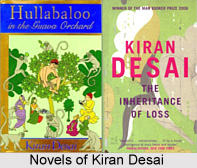 Kiran Desai is an Indian author born on 3rd September, 1971 in New Delhi. Her novel "The Inheritance of Loss" won the "2006 Man Booker Prize" and the "National Book Critics Circle Fiction Award". Kiran Desai is an Indian author who is a citizen of India and a permanent resident of the United States. She is the daughter of the noted author Anita Desai who herself is short-listed for the Booker Prize on three occasions. Kiran Desai became the youngest female writer to win the award when she received the "Booker Prize" for the novel in 2006.
Kiran Desai is an Indian author born on 3rd September, 1971 in New Delhi. Her novel "The Inheritance of Loss" won the "2006 Man Booker Prize" and the "National Book Critics Circle Fiction Award". Kiran Desai is an Indian author who is a citizen of India and a permanent resident of the United States. She is the daughter of the noted author Anita Desai who herself is short-listed for the Booker Prize on three occasions. Kiran Desai became the youngest female writer to win the award when she received the "Booker Prize" for the novel in 2006.
Life of Kiran Desai
Kiran Desai was born in Chandigarh on the 3rd of September in the year 1971 and spent the early years of her life in Pune and Mumbai. She studied in the Cathedral and John Connon School. She left India at 14, and she and her mother then lived in England for a year, and then finally moved to the United States. She took her early education in Massachusetts. Then she studied creative writing at Bennington College, Hollins University and Columbia University.
Works of Kiran Desai

Kiran Desai"s first novel, "Hullabaloo in the Guava Orchard", was published in 1998 and received accolades from notable figures like Salman Rushdie. It won the "Betty Trask Award", a prize given by the "Society of Authors" for the best new novels by citizens of the Commonwealth of Nations under the age of 35. Her first novel is about a young man in provincial India who abandons an easy post office job and begins living in a guava tree. From there he made oracular pronouncements to the local people. Unaware that he knows of their lives from having read their mail, they hail him as a prophet.
Kiran Desai"s second book, "The Inheritance of Loss" published in 2006 was widely praised by critics throughout Asia, Europe and the United States. While working on what would become her second novel, Desai lived a wandering life that took her from New York to Mexico and India. After more than seven years of work, she published her second novel. The subject of The Inheritance of Loss is set partly in India and partly in the USA. In this novel she illustrates the difference between the living pattern in India and abroad. Set in India in the mid-1980s, the novel has at its centre a Cambridge-educated Indian judge living out his retirement in Kalimpong, near the Himalayas, with his grand-daughter until their lives are disrupted by Nepalese rebels. The novel also links the story of the judge"s cook"s son as he struggles to survive as an illegal immigrant in the United States. The Inheritance of Loss was praised by critics as an intense and richly descriptive analysis of globalization, terrorism and immigration.



















